 Petzlover
Petzlover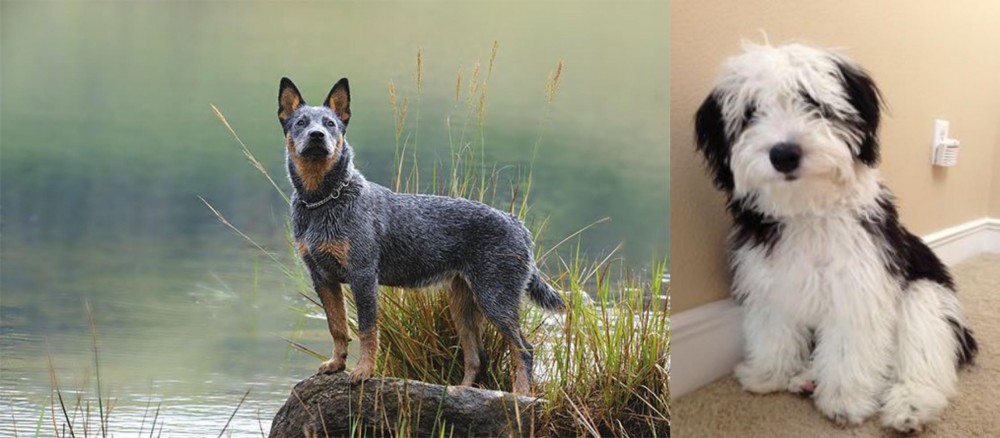 Blue Healer is originated from Australia but Mini Sheepadoodles is originated from United States. Both Blue Healer and Mini Sheepadoodles are having almost same height. Both Blue Healer and Mini Sheepadoodles are having almost same weight. Both Blue Healer and Mini Sheepadoodles has same life span. Both Blue Healer and Mini Sheepadoodles has almost same litter size. Blue Healer requires Low Maintenance. But Mini Sheepadoodles requires Moderate Maintenance
Blue Healer is originated from Australia but Mini Sheepadoodles is originated from United States. Both Blue Healer and Mini Sheepadoodles are having almost same height. Both Blue Healer and Mini Sheepadoodles are having almost same weight. Both Blue Healer and Mini Sheepadoodles has same life span. Both Blue Healer and Mini Sheepadoodles has almost same litter size. Blue Healer requires Low Maintenance. But Mini Sheepadoodles requires Moderate Maintenance
 It was in 1802 that George Hall arrived in New South Wales, establishing 2 cattle stations. He had a problem – getting his thousands of cattle to the Sydney markets. He began looking at the prospect of a droving dog and imported a number of dogs of which a blue mottled dog emerged.
It was in 1802 that George Hall arrived in New South Wales, establishing 2 cattle stations. He had a problem – getting his thousands of cattle to the Sydney markets. He began looking at the prospect of a droving dog and imported a number of dogs of which a blue mottled dog emerged.
The dogs were crossed with dingoes and by 1840 the Halls Heelers were used by the Halls. However with the death of one of the Halls, their cattle stations went to action and the dogs, the Halls Heelers became available.
The dogs attracted attention, and the term ‘Australian Cattle Dog’ was adopted. The name referred to those dogs coming from Thomas Hall's ‘Heelers’. There have been many arguments about the origin of the breed, but the red or blue offspring known as Hall's Heelers were proven cattle drovers, and with further breeding experiments which included the Australian Kelpie, dingoes and the Dalmation, by 1893, the tough, robust working breed known as the Blue Heeler or the Australian Cattle Dog came about.
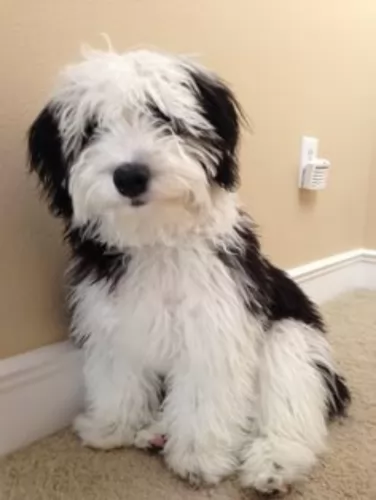 The Mini Sheepadoodle is such a sweet, teddy bear of a dog. It comes from two awesome dog breeds – the Old English Sheepdog and the Miniature Poodle. It is thought that the dog originated in the USA.
The Mini Sheepadoodle is such a sweet, teddy bear of a dog. It comes from two awesome dog breeds – the Old English Sheepdog and the Miniature Poodle. It is thought that the dog originated in the USA.
They are two very different looking dogs, but their personalities are fairly similar. This designer dog isn’t purebred and isn’t registered with the American Kennel Club (AKC).
 Blue Heelers are medium-sized, sturdy, compact dogs who are somewhat longer than tall. The female Blue Heeler measures roughly 43–48cm at the withers, while the male measures about 46–51cm. If your Blue Heeler is in tip top condition, he’ll weigh about 15 to 22 kilograms. They are muscular with pointed, erect ears, dark eyes and long tails which are mostly hanging downwards. Their dense coats are blue- or red speckled and sometimes with tan markings.
Blue Heelers are medium-sized, sturdy, compact dogs who are somewhat longer than tall. The female Blue Heeler measures roughly 43–48cm at the withers, while the male measures about 46–51cm. If your Blue Heeler is in tip top condition, he’ll weigh about 15 to 22 kilograms. They are muscular with pointed, erect ears, dark eyes and long tails which are mostly hanging downwards. Their dense coats are blue- or red speckled and sometimes with tan markings.
The Blue Heeler is a ball of energy and he is clever too. You won’t find him sitting around for too long, and if there is sign of a walk or a ball game, he’s in! He is an independent dog, and although he makes a wonderful family pet, he tends to attach himself to that one special person in his life. He is a natural watchdog and protector of his human family.
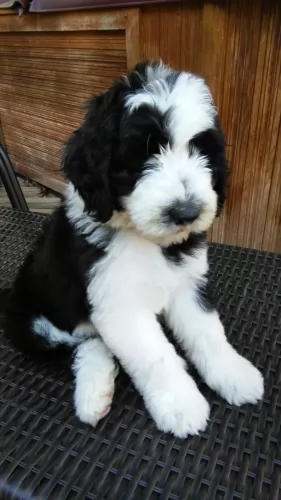 The Mini Sheepadoodle, a mix between the Mini Poodle and Sheepdog stands at between 48 and 52cm and weighs between 11 to 20kg.
The Mini Sheepadoodle, a mix between the Mini Poodle and Sheepdog stands at between 48 and 52cm and weighs between 11 to 20kg.
He is solidly built with a broad skull and face. The coat is usually medium length and can be either straight, wavy or curly. The coat can be quite a few colors depending on the parents. Some are brown, cream or black while others are white and grey or white and brown.
He is a low shedding dog. He has a double coat which will still need brushing. This hybrid breed has a thick coat that will need to be trimmed professionally every now and then as well. This is good for hot weather and for reducing the time it takes to groom the pet.
They’re easy-going, social dogs, loving to spend time with their human families. They are gentle and patient with children and they get on well with other pets in the home as well.
The Poodle is a very intelligent dog and because there is Poodle in the Mini Sheepadoodle, you can be sure that your dog is going to be bright too and that he will be able to be trained and socialized with ease. They’re friendly and don’t do too well as watchdogs.
 Training and socializing of your Blue Heeler will ensure that your dog does what you want him to. The Blue Heeler is an intelligent, responsive dog and training can benefit him, turning him into an outstanding family pet, good with children and other pets in the home.
Training and socializing of your Blue Heeler will ensure that your dog does what you want him to. The Blue Heeler is an intelligent, responsive dog and training can benefit him, turning him into an outstanding family pet, good with children and other pets in the home.
He is a playful, affectionate pet who doesn’t take easily to strangers, and this is what makes him such an excellent guard dog.
Your Blue Heeler is not an apartment dog as he requires a lot of exercise, and cooping him indoors for too long with nothing to do can lead to destructive behavior.
Head-strong, independent and robust, your Blue Heeler will need a firm owner who is boss. Add to the firm owner a lot of love and care, and you’ll have a devoted friend.
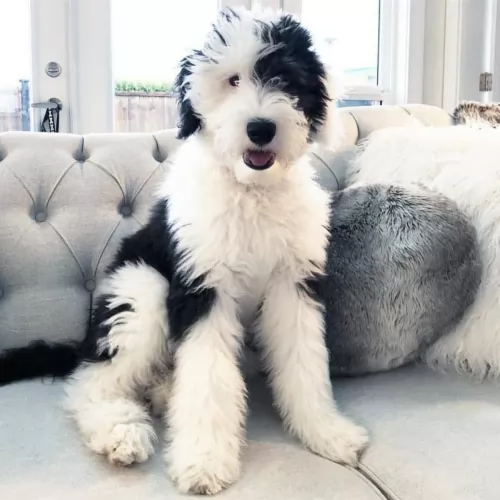 The Mini Sheepadoodle is such an affectionate teddy-bear dog and is calm, gentle and loving.
The Mini Sheepadoodle is such an affectionate teddy-bear dog and is calm, gentle and loving.
They make perfect family pets and want to please their owners. He is friendly and gets on well with his human family as well as with other pets in the home.
Children love him as he is always willing to have a game. They’re sociable and playful and make a wonderful canine pet and companion in your home.
 Australian cattle dogs are healthy and can live up to 15 years of age, but even so there are some genetic conditions that you will need to be aware of following
Australian cattle dogs are healthy and can live up to 15 years of age, but even so there are some genetic conditions that you will need to be aware of following
Eye issues which includes progressive retinal atrophy – this disease is an inherited disease of the retina of the eye where the rod cells are destined to die. Fortunately it is not painful for the dog. There are different types of inherited retinal degenerative diseases in dogs but going into detail with them is beyond the scope of this article. For more information you can chat to your vet.
Recessive piebald elleles - the Blue Heeler has recessive piebald alleles which can produce white in the skin and coat and which is linked to congenital hereditary deafness.
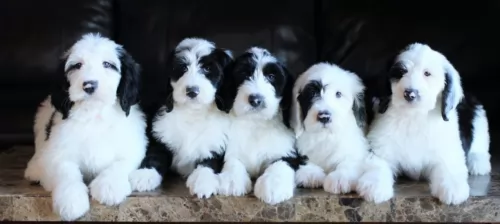 They’re healthy dogs and you’re not likely to be spending too much time at the vet. Every dog can be prone to any one of the many common dog illnesses there are. These can be hip dysplasia, obesity, bloat, dental disease, cataracts and more.
They’re healthy dogs and you’re not likely to be spending too much time at the vet. Every dog can be prone to any one of the many common dog illnesses there are. These can be hip dysplasia, obesity, bloat, dental disease, cataracts and more.
This can be a life-threatening disease and treatment will be required as soon as possible. Known also as gastric dilatation and volvulus, the stomach twists and fills with gas. The dog’s stomach becomes distended with gas, and pressure is placed on the diaphragm, creating breathing problems.
Your dog will have a swollen stomach, he’ll be drooling and panting and he’ll be restless and he may even make little whimpering noises because he is in pain. He may be trying to vomit. Your dog needs to get to the vet immediately.
This is a leading health concern with many dogs and with the Mini Sheepadoodle as well. It’s a condition where there is an abnormal formation of the hip socket. It can lead to pain and arthritis and you may even notice your once-active pet battling to do what he once did, even when he is still young.
There are things that can be done though and your vet will discuss treatment methods with you and ideas to make it comfortable for your pet.
 Remember that your Blue Heeler was once a full time cattle dog where he used to become totally and utterly exhausted from herding cattle. This is what he loved – the activity. If you have a Blue Heeler, you will need to provide him with plenty of exercise.
Remember that your Blue Heeler was once a full time cattle dog where he used to become totally and utterly exhausted from herding cattle. This is what he loved – the activity. If you have a Blue Heeler, you will need to provide him with plenty of exercise.
If you live on a farm, your Blue Heeler will be in his element because he can run, walk and swim to his heart’s content. If you keep your Blue Heeler in your back garden, you will need to provide him with ball games, rope games, long walks, running on a leash as you cycle and other activities.
Your Blue Heeler has a short, weather-resistant double coat. He’s not a heavy shedder, but he will have his share of seasonal shedding, so it’s a good idea to get into the habit of brushing him at least twice a week. This will get rid of all those loose hairs and keep his skin healthy by getting the blood flowing and distributing his natural oils.
Giving the best dog food for your Blue Heeler will come from either your home made food or a top quality commercially manufactured dog food. He is such a high energy dog, that your veterinarian can advise you on a dog food specially designed for high energy breeds.
These foods are well balanced and are enriched with amino acids and vitamins, promoting healthy bones and joints. Remember to include some raw meat into your dog’s diet and to ensure a constant source of cool, fresh water.
Ensure your Blue Heeler’s ongoing health by paying attention to ears, nails and teeth.
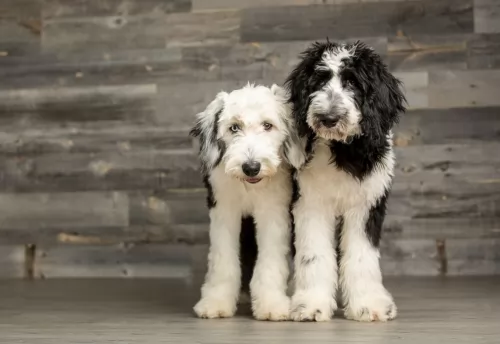 The Mini Sheepadoodles will need quite a lot of exercise as he is an active dog. Walks are always a super idea, and hikes even better. He will love other forms of activities such as ball games, hide and seek, ropes games and general rough and tumble games.
The Mini Sheepadoodles will need quite a lot of exercise as he is an active dog. Walks are always a super idea, and hikes even better. He will love other forms of activities such as ball games, hide and seek, ropes games and general rough and tumble games.
A brush every other day will be required. You can have your pet professionally trimmed. Check him over during brushing for unusual lumps. Check inside his ears and inside his mouth as he can’t tell you about ear infections or a bad tooth causing him a lot of pain.
Provide your wonderful dog with the best food there is. Just like human beings, food plays an important role in good health. Learn to read the labels on commercially manufactured dog foods and try to feed your pet natural, wholesome foods with vitamins and minerals.
Some of the more inferior brands pump their foods full of colorants and preservatives. Try and provide your Mini Sheepadoodle with some home-made food which is simple and free of spices. Things like boiled chicken, brown rice and vegetables chopped up and added to the dry kibble sometimes can do your pet a lot of good.
Make sure his vaccines are up to date and make sure you have a reliable trusted vet to turn to when he is sick.